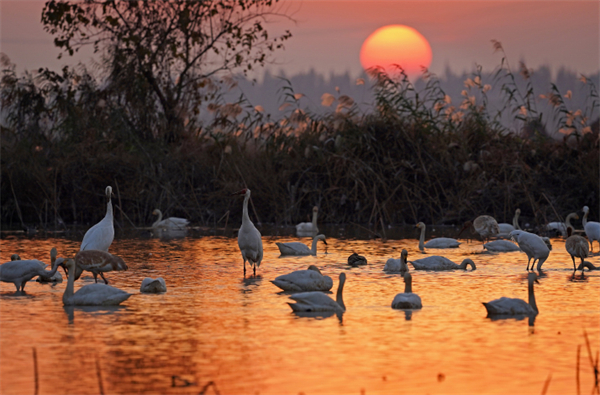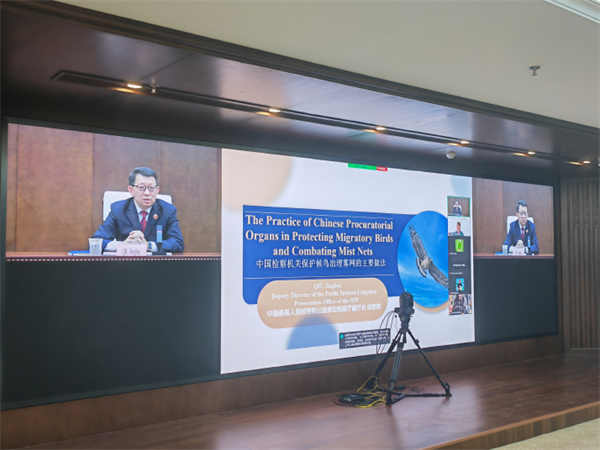
White cranes and other migratory birds rest at the Wuxing White Crane Conservation Area in Nanchang, Jiangxi Province, on December 17, 2024. [Xinhua]
Every spring and autumn, thousands of migratory birds transit the skies over China, following well-established routes between their breeding and wintering grounds. This awe-inspiring migration is one of the country's most remarkable natural spectacles.
China is home to over 1,500 bird species—13 percent of the world's total—and more than 800 of them move between homes during migration seasons. With four of the planet's nine major bird migration flyways intersecting its territory, China plays a pivotal role in maintaining global avian biodiversity. However, the safe passage of these migratory birds is being increasingly threatened by mist nets.
Almost invisible to birds in flight, mist nets are strung between trees in areas known to be frequented by migrating target bird species. Once caught, the birds become part of the illegal trade in wildlife.
In response to this pressing issue, Chinese procuratorial authorities have intensified efforts to combat illegal poaching, enforce wildlife protection laws and raise public awareness. By enhancing legal oversight and promoting cross-departmental cooperation, they aim to ensure a safer passage for these migratory species.
Particularly, public interest litigation is used by people's procuratorates to ensure those participating in the use of mist nets to hunt birds for consumption, sale or other illicit purposes provide compensation for the damage they cause and undertake other restoration efforts.
Chinese law empowers procuratorial organs, wildlife protection authorities and environmental non-governmental organizations (NGOs) to file public interest lawsuits against actions that damage wildlife resources, ecological environments and social public interests, Qiu Jinghui, Deputy Director of the Public Interest Litigation Procuratorial Department of the Supreme People's Procuratorate (SPP), the highest procuratorial organ of China, said at a webinar on tackling mist nets as a threat to wild birds in the East Asian-Australasian Flyway, held by BirdLife International, a global partnership of 123 nature groups, on January 18.
Therefore, China's efforts in the protection of migratory birds and the management of mist nets carry a distinct prosecutorial characteristic, Qiu added.

Qiu Jinghui, Deputy Director of the Public Interest Litigation Procuratorial Department of the Supreme People's Procuratorate, speaks at a webinar on tackling mist nets as a threat to wild birds in the East Asian-Australasian Flyway on January 18. [Courtesy photo]
An innovative system
After a two-year pilot program, China instituted the mechanism for procuratorial organs to file public interest lawsuits on July 1, 2017. In recent years, people's procuratorates across the country have handled more than 1.1 million public interest cases, the SPP said on December 20, 2024.
More than 530,000 of these cases were in the field of ecological environment and resource protection, while over 200,000 involved food and drug safety. The SPP has also filed public interest lawsuits involving the protection of minors, the protection of heroes and martyrs, workplace safety, personal information protection, and the protection of cultural relics and heritage.
"Very few other countries have such a system," Dimitri de Boer, Regional Director for Asia at ClientEarth, a well-known environmental organization, and special adviser of the China Council for International Cooperation on Environment and Development, told newspaper China Daily.
According to de Boer, compared to European countries, where public interest litigation is primarily initiated by individuals and NGOs, China's system, in which prosecutors initiate such cases, has unique advantages and has made vital contributions to ecological and environmental protection.
In September 2023, at a seminar on wetland protection hosted by the people's procuratorate in Yancheng, Jiangsu Province, participating bird specialists from ClientEarth were consulted on what would be the most effective measure to protect wetlands.
De Boer, one of the specialists, said at the event that, apart from all the efforts already made, another effective measure would be to prioritize actions against illegal mist nets, which up until then were widely available on e-commerce platforms in China, killing millions of birds every year and possibly causing the extinction of some species.
This advice aligns well with the extensive work done by people's procuratorates in recent years, Qiu said. For instance, people's procuratorates in Guangxi Zhuang Autonomous Region handled several cases involving the illegal hunting of wild birds in 2019. This led participating prosecutors to call for stricter regulation of prohibited hunting tools, and their advice was enshrined in the revised Law on the Protection of Wildlife, which went into effect on May 1, 2023.
Since the revised law explicitly bans the use of clapnets, which are closed by pulling a string, as a hunting tool, the SPP has coordinated efforts both online and offline to crack down on the production, sale and use of the net.
The SPP has also promoted the Green Internet Program. Under the program, users will be redirected to a page explaining laws and regulations, the status of endangered animals, and wildlife conservation efforts when searching keywords like "clapnet" on e-commerce and social platforms. The initiative aims to enhance consumer compliance awareness and prevent illegal activities.
"Ensuring that e-commerce platforms display warnings for anyone searching for these nets is a good first step that sends a clear message and creates a foundation for further action to restrict the public availability of these nets," Terry Townshend, a member of the Global Advisory Group of BirdLife International and joint China representative of the Oriental Bird Club, a UK-based charity that promotes the interests and conservation of wild birds of the East Asia region, said in a letter of appreciation to the SPP and Qiu after the webinar.
Joint efforts
In addition to instituting public interest lawsuits, procuratorial organs have also strengthened cooperation with wildlife protection authorities and environmental NGOs, including through the sharing of information and expertise, thereby enhancing joint efforts in the fight against mist nets, according to Qiu.
The SPP has also established a volunteer platform to enhance public participation, which has involved 120,000 individuals. They contribute by providing case leads for public interest litigation and assisting in on-site investigation, hearings and other missions, he added.
Addressing the issue of illegal mist nets requires collaborative efforts, Townshend said, adding while China's initiatives in this area are still in their early stages, they are promising and have the potential to influence neighboring countries by setting a role model for bird conservation.
He stressed that it is also in line with the goals of the Kunming-Montreal Global Biodiversity Framework. The Kunming-Montreal Global Biodiversity Framework is a landmark agreement reached in 2022 at the 15th Meeting of the Conference of the Parties to the UN Convention on Biological Diversity, which was endorsed by over 190 countries under China's presidency.
According to the SPP, China's approach to ecological governance features preventive and systematic initiatives, collaborative efforts, public involvement and digital empowerment. When illegal acts threaten the ecological environment and resource safety, procuratorial organs can initiate preventive public interest litigation, Qiu explained.
For instance, provinces including Zhejiang and Shandong have encountered the issue of bird-proof nets, used by farmers in agriculture and aquaculture, causing the deaths of migratory birds. In response, procuratorial organs have urged local governments to enhance bird-friendly measures and improve the insurance-based ecological compensation mechanism to support affected farmers.
"Engaging local communities is so important—solutions will be sustainable only if the interests of local communities, especially farmers, are taken into account," Townshend said.
China's effort is "helping to prevent the extinction of species and supporting national and international biodiversity goals," Townshend said, adding, "Given the risks of biodiversity loss, if we look after nature, we look after ourselves."
